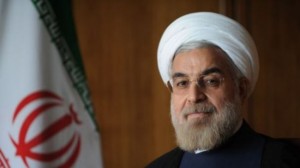 Iranian President Hassan Rouhani, or possibly employees of his, continue to tweet on his official account, as does Iran�s foreign affairs minister, Mohammad Javad Zarif. Rouhani and Zarif are active on Twitter even though the Iranian authorities still ban their citizens from using it and other social networking websites. But this is just a minor detail for the Iranian regime.
Iranian President Hassan Rouhani, or possibly employees of his, continue to tweet on his official account, as does Iran�s foreign affairs minister, Mohammad Javad Zarif. Rouhani and Zarif are active on Twitter even though the Iranian authorities still ban their citizens from using it and other social networking websites. But this is just a minor detail for the Iranian regime.Anyone who reads the tweets of the so-called �moderate� president and his foreign affairs minister will realize that the same terms are repeated: justice, peace and stability. The two tweet in English to address the West, not to the people of Iran.
This �moderate� president and his minister are aware that their smiles and expressions will attract more attention than their actions, especially in this apparent phase of Iranian�Western openness which aims to mitigate concern over Iran�s human rights violations.
As a result, the fact that at least 80 people have been executed by the regime over the past two months is being overlooked. Last year, executions exceeded 500. About a third of them took place after the election of Rouhani last summer. This means that around 300 executions have taken place under this �moderate� president.
This year�s most famous executions were those of Hashem Shaabani, an Arab�Iranian poet from Ahvaz, and Hadi Rashedi. They were hanged for �corruption, violating national security and waging war on God.�
Shaabani was executed in complete secrecy, after a trial that was condemned by all international human rights organizations for failing to meet the minimum standards of transparency and justice. Confessions from the two were broadcast, and it was clear that they were obtained under duress.
In his alleged confession, Shaabani said he was member of a terrorist separatist group. But the truth is the Iranian judiciary did not present one single tangible piece of evidence that proved this to be the case.
Shaabani was a young Arab poet and teacher who set up a poetry magazine. Some of his writings criticized the regime and its abuses against the Arab minority in Ahvaz, which is why he was accused of waging war on God.
The exact date of his execution was kept secret. The irony here is that Rouhani, the �moderate� president, visited the Ahvaz area shortly before the execution to talk about the rights of ethnic minorities.
It is true that Iran is not the only country that is afraid of poets, and it�s not the only country whose regime is terrified by words and ideas, but the hanging of Shaabani tells us a lot about Iran. The Iranian government�s attempt to change its image from the era of former President Mahmoud Ahmadinejad is hypothetical at best. When it comes to practice, not theory, the unpleasant reality of Iran as a tyrannical regime still holds true. Shaabani�s forced confession was a derogation of justice, and took the place of a just, public and transparent trial.
The execution of a poet sums up the Iranian regime.
By Al Bawaba
The Iran Project is not responsible for the content of quoted articles.










